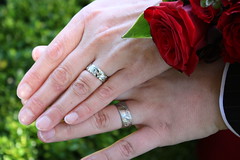Political Words
I never thought of the words "wife", "wedding" or "marriage" as terribly political or radical until CK and I celebrated our wedding and met our lack of marriage rights head on.
Since our marriage last September I've been using the word "wife" to refer to CK. I mean, she is the woman I'm married to, so it doesn't seem really far-fetched at all. There's a part of me that doesn't think much about it at all.
Why should I think twice about referring to the woman I married as my wife?
Then there's the rest of the time when I'm aware of just how political using the word "wife" to describe my female partner is. It is in the reaction I get from people, ranging from delight to confusion to disapproval, that I'm reminded that we've done something that is still considered very political.
I bridle at the suggestion that we had a "commitment ceremony". That phrase strikes me as just as dismissive of our relationship as "domestic partnership". Really all marriages are ceremonies of commitment, but we don't call them that. We call them wedding ceremonies and currently people have a tendency to categorize a wedding as something only heterosexual couples have.
When I refer to our wedding ceremony and our marriage I am often asked where we went. Our home state voted in a constitutional amendment defining marriage as being something only allowed to heterosexual couples. Invariably I will be asked about marriage being legal in Oregon when I say that we held our wedding in the bandstand in a park near our home, "But I thought you couldn't marry legally in Oregon?"
And that is sadly correct. We cannot be legally married in Oregon, however, that doesn't mean that to us and to the gathered witnesses there that day, that what we celebrated was any else but our wedding. We often clarify that we were lovingly wed since we cannot currently be legally wed. Eventually the legality of the situation will catch up with what we know we celebrated with 70+ of our close friends and family.
We didn't invite our loved ones to our "Registration", we invited them to our wedding. We've never said happily that we were "Just Registered", we have instead told people we are newly wed. Quite honestly, I don't even recall the actual day we officially registered as domestic partners. It is easy to track down, I know we both made comments on Twitter about it. It isn't as important as the day we were wed, that's the anniversary we will celebrate.
I love thinking of CK as my wife, using that word to describe both myself and her. Each time I use that word I am reminded of the vows we made to one another, of our beautiful wedding day, and of our love for one another. I imagine this isn't so very different from a heterosexual couple referring to their spouse as "wife" or "husband".
I reject words like "partner" and "commitment ceremony". Those words do not apply to the marriage shared by my wife and I. If I say "wife" to someone and they respond back in calling CK my "partner", I will compassionately, but firmly correct that person. I find myself having to remind people that what CK and I have is a marriage, regardless of it being legally recognized by our state or country.
In rejecting those words I seek to normalize the idea that words like "wife", "spouse", and "marriage" should not be restricted to heterosexuals. When someone calls our marriage a "registered domestic partnership", calls my wife my "partner", or refers to our wedding as a "commitment ceremony", it hurts, it is disrespectful, and feels as though the speaker seeks to diminish the importance of our union.
As a further reminder about how same-sex couples feel about having their marriages legally recognized, check out some photos from recent marriages taking place in New York.
